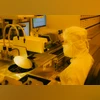)
About 2,200 Onsemi employees in the country make 10 million chips a day for car, industrial and telecommunications customers | Credit: Bloomberg
The Czech town of Roznov pod Radhostem was best known for its rum-drizzled sweet pies and an open-air museum showing off historical wooden houses. Then came an announcement that stirred the sleepy backwater.
US chipmaker ON Semiconductor Corp. picked Roznov for a new $2 billion manufacturing hub in June. The past few weeks have seen a flurry of visits by property developers, the head of a local university and government officials followed around by television crews.
The interest isn’t surprising given the investment will be the biggest by a foreign company in the Czech Republic for three decades. But it also reflects how there’s more riding on the plan to make a new generation of microchips than the prospects of a corner of central Europe.
“Semiconductors are becoming the backbone of the modern economy,” Industry and Trade Minister Jozef Sikela said. “The more of these new technologies we can produce domestically, the better for our economic security.”
The Onsemi investment is modest compared with some technology projects elsewhere in Europe. But the current Roznov facility already plays an outsized role within the company because it designs as well as produces semiconductors. That’s key to moving the Czech economy toward more profitable, less labor intensive industry than traditional car and auto component manufacturing.
About 2,200 Onsemi employees in the country make 10 million chips a day for car, industrial and telecommunications customers such as BMW AG, Mercedes-Benz AG, Siemens AG, Apple Inc. and Samsung Electronics Co.
The first challenge, though, is to make sure the town of 16,000 people can cope with the expansion. To allay concern among locals about a shortage of schools, doctors and housing, Mayor Jan Kucera said between 300 and 400 new apartments will be built while the town will spend the equivalent of $85 million to improve local roads, parking and other services.
The prospect of the town’s joining the next industrial era stands in a stark contrast to the challenges faced by the neighboring region around the city of Ostrava, just an hour away by car. Since the end of Communism in 1989, the easternmost part of the Czech Republic has been plagued by a steep decline of the traditional mining and metallurgical industries, and chronic unemployment.
Just this summer, a dormant steelmaker in Ostrava declared itself insolvent after it couldn’t pay energy bills and salaries to its almost 5,000 employees.
Production of semiconductors in Roznov goes back to the early days of the Cold War, when then-communist Czechoslovakia moved a chunk of its electronics industry there from a place near the German border. After the Berlin Wall fell, the conglomerate — then called Tesla Roznov — was broken up, with its chip unit sold to mobile phone pioneer Motorola Inc. and later becoming part of its Arizona-based Onsemi spinoff.
The new facility will handle the entire manufacturing process from growing silicon carbide crystals to the final product rather than those being split between Onsemi’s sites on three different continents.
That means chips will be made closer to customers in the car industry, the traditional driver of the Czech economy and now beset by rapidly rising wages, global supply-chain disruptions and competition from Chinese electric vehicles.
A month after announcing the Roznov expansion, Onsemi signed a multi-year deal to supply silicon-carbide parts to Volkswagen, owner of the dominant Czech manufacturer, Skoda Auto AS. Both VW and Skoda have had to repeatedly curtail or suspend production over the past three years because of supply disruption to chips made mostly in Asia.
Onsemi is still negotiating with the Czech government and the EU about financial support, which may cover about a quarter of the investment. If all goes well, the company plans to start building a new production hall next year across the street from its existing compound in Roznov.
One Roznov resident called Ivana said she could see the longer-term benefits for the Czech Republic, yet expressed concern about the pressure on public services because of an influx of new workers. It’s already hard enough to find a dentist for her small children, she said as she walked with them in the town’s colorful main square.
“My feelings are mixed,” said Ivana, declining to be identified by her full name when speaking to the media. “I know this is important for the country, and good advertising for Roznov. But I’m concerned about the local impact.”
Indeed, the project has been heralded by politicians and business leaders as a boon for a country that was once a poster child of economic transformation from communism to free market.
The lowest unemployment in the EU has proved a curse rather than a blessing: Wage growth has for years significantly outpaced productivity, contributing to an inflation crisis the country is still reeling from.
Onsemi wants to help fill that void, according to Ales Cab, head of the US company’s Czech business. Once new supply chains are set up, carmakers and other chip buyers are likely to stick with them for at least two decades, he predicted.
(Only the headline and picture of this report may have been reworked by the Business Standard staff; the rest of the content is auto-generated from a syndicated feed.)
First Published: Aug 13 2024 | 10:42 AM IST








